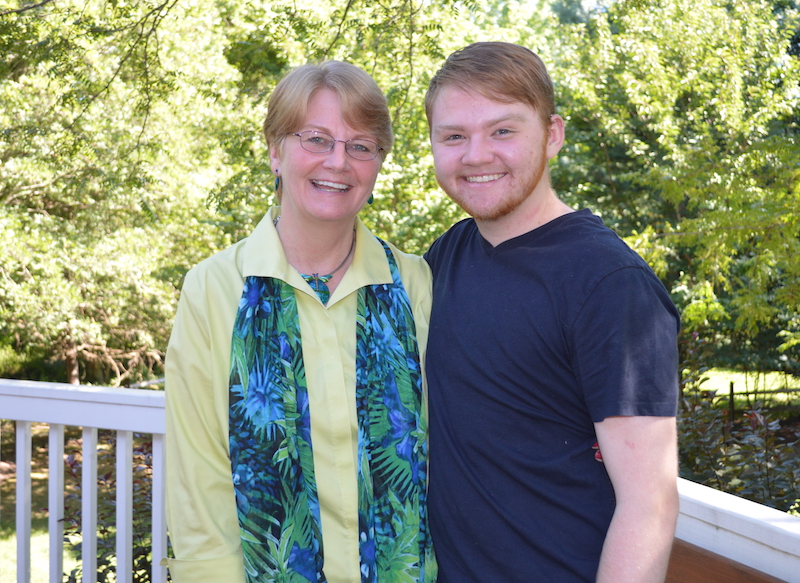
Stoga grad Cal McMillan and mom Stacy Stone.
Don’t bother searching for Cal Stone McMillan in Conestoga’s 2013 yearbook. The only McMillan listed is brainy trumpeter Caroline, and well, she’s long gone.
Because Caroline, in trans parlance, is Cal’s “dead name.”
In print and in person, Caroline has been largely erased – birth certificate, passport and driver’s license all read “Calvin” now. Calling Cal “Caroline” would be “deadnaming,” disrespectful because it signals non-acceptance.
Along with the masculine name, there’s a manly physique, a strong handshake, a deeper voice, a beard.
Most of the physical transitioning occurred in the last few years, but, make no mistake: Cal has been a long time coming. In every way and at every juncture, his journey has been excruciating – not just for him, but also for his parents, who fought his transition long and hard.
“We were horrible. As parents, we made so many mistakes. We did everything wrong,” his mother admits.
But the ugliness is behind them. And Cal and his family – his mother, Stacy Stone, his father, Steve McMillan, and brother Patrick – have come out on the other side: whole, happy and willing to share their story so that others might learn … and accept.
They believe Cal can put a friendly face on the unfathomable. Because for many, Cal McMillan, 23-year-old transgender man, embodies the ultimate other, the final frontier of acceptance. Hear his story and endeavor to understand. That’s all he asks.
Buried in sci fi books and buddies, Cal remembers his early years as happy. When counselors at Valley Forge Elementary recommended Cal skip first grade, his parents said no, their daughter wasn’t socially mature enough.
“I was a weird kid,” Cal recalls, grinning. “My friends were a pretty weird group, too.” While middle school classmates were trying to fit in and be popular, Cal’s friends were “socially different” and “doing immature” things like holding stuffed-animal parties in their lockers, he says.
Cool they were not.
He earned his first black belt at age 13, a model of discipline and focus.
Ferociously gifted, Cal loaded up on – and aced – AP and honors classes at Conestoga. He won a National Merit Scholarship. His SAT scores were stratospheric: 2370 – 30 points from perfect. He competed in the Science Olympiad and played trumpet in Stoga’s marching bands and jazz ensembles.
Still, ask Cal how he remembers high school and you get this: “It was stressful. I put a high premium on doing well. I didn’t sleep much.” Part of the pressure came from his Harvard-educated parents, he says, part came from within.
By outward measures, though, Cal seemed fine, blessed with talent, drive and a diverse group of loyal friends.
But on the inside, waves of confusion and hopelessness roiled, and, increasingly, threatened to swallow him.
Signs that Cal might be fundamentally different from his friends came early but were easy to write off. Brilliance breeds non-comformity, right? Refusing to look or act girly was just healthy self-expression, wasn’t it?
“I was always a tomboy,” Cal says. “I never willingly wore a dress after age 2.” When he was 12, he told his parents to stop asking: he would never put on a skirt or dress again.
Serious gender questioning began in high school. Cal says he stumbled on a community online that – eureka! – had words to describe how he felt: “gender dysphoria,” “nonbinary,” “gender misidentified.”
His parents, meanwhile, hadn’t a clue. “Cal even had a boyfriend for a while in 10th grade,” Stacy recalls. “We truly had no idea.”
At odds with his now obviously female body, Cal became seriously depressed during junior year and started cutting – slicing his arms – the next summer. At one point, he says he was suicidal. Such feelings are not unique in the trans community; more than 40 percent of trans people attempt suicide.
For Cal, everything was kept under wraps. If he could hide it, maybe it would go away: his gender questioning, his shame over his female body, his mounting depression. He hunched over in baggy flannel shirts and shapeless jeans. Rubber bracelets hid the slashes on his wrists.
It wasn’t until a friend alerted a guidance counselor to the scars on Cal’s arms that his parents knew their firstborn, always quirky, was in serious pain. Cal gave his parents just one reason for cutting: “I’m not perfect.”
“I’d never even heard of cutting,” Stacy recalls. “I don’t know what bubble I’d been living in.” Upended, the whole family went to therapy.

Malvern native Cal McMillan in 2013.
Over time Cal confided his gender dysphoria to his therapist and began floating the idea of transitioning with his friends. All were supportive, he says.
More signs of gender change came the second half of senior year. Cal cut his hair short at a time when “all the girls at Stoga had long hair.” And he began wearing boxers beneath his jeans.
When Stacy found them among Cal’s clothes, she flipped. She and Steve had long since given up trying to get their daughter to wear dresses, but boys’ underwear? “I told Cal, ‘That’s where I draw the line.’”
A horrific fight followed, during which Cal, for the first time, declared: “I’m non-binary.”
Stacy had never heard the term. She thought her daughter might come out as a lesbian perhaps, but nonbinary?
A second bombshell came in March of senior year when Cal was at the Philadelphia Flower Show with his mother and some friends. He suddenly had to sit down and couldn’t catch his breath. His friend insisted Cal tell his mom the truth: he couldn’t breathe because he was wearing a chest binder, a corset-like undergarment that transgender men use to flatten their breasts. If worn too long, binders can inhibit breathing.
Horrified, Stacy threw the binder away.
“I was screaming and crying,” Stacy recalls. “I was keening – truly hysterical – as Cal tried to explain what was going on. My husband and I didn’t respond well. We said horrible things. I truly felt like my child had killed my child. We thought: ‘This was our baby girl. What had happened to our baby girl?’”
At one point, their younger son Patrick came out of his room and asked what was going on. “Your sister wants to be your brother,” his mother screamed.
By the end of senior year, Cal found friendlier ears in the basement of a Wayne church, at weekly meetings of the Main Line Youth Alliance (MYA), which hosts adult-facilitated support sessions for LGBTQ youth. His public transition had begun.
He began calling himself Cal at MYA and with his Stoga friends. He showed up at senior prom in a tux.
“Conestoga didn’t say anything. All my friends were cool about it,” Cal remembers. “That’s the only reason I went – because I could wear a tux.” (He’d previously shunned school dances because in those days T/E required girls to attend in dresses.)
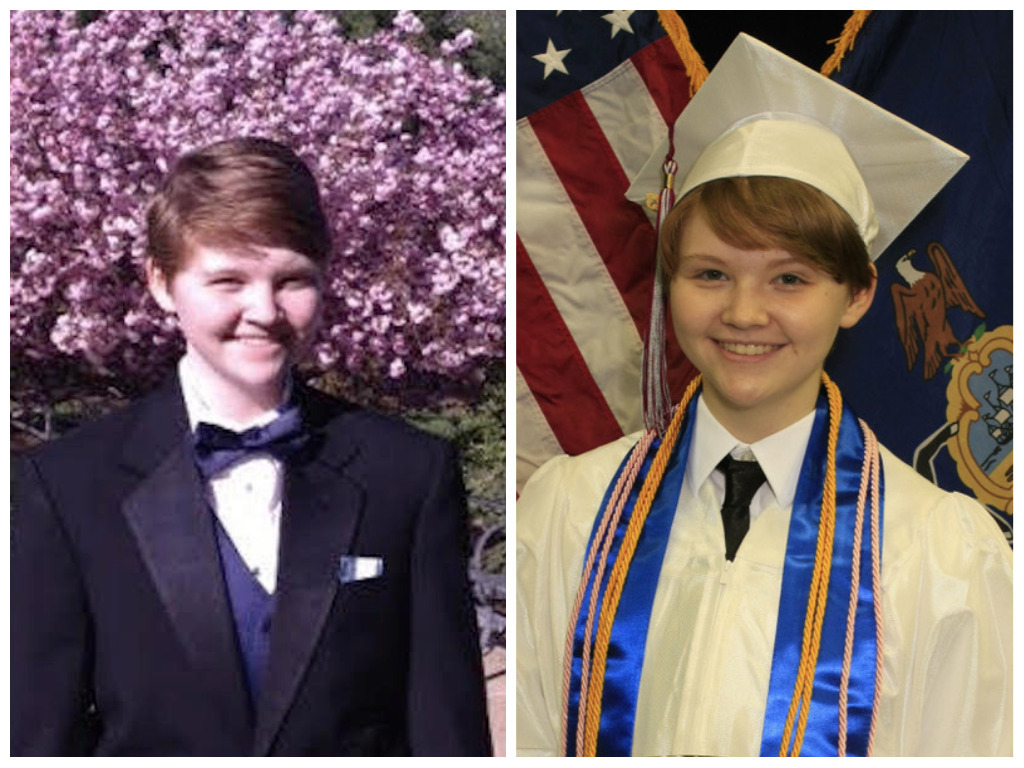
Cal at his senior prom and Conestoga graduation.
Shaken, his parents arranged for Cal to see a therapist who specialized in gender-variant youth. “We wanted this person to say, ‘You’re wrong, Cal.’ But she didn’t. Instead, she introduced us to a support group for parents of trans kids.”
Stacy started going to meetings. “I still wasn’t accepting but I went and I listened.”
Life after Conestoga was a fresh start. Highly selective and highly progressive, Pomona College in Claremont, California was the kind of college that asked incoming students their “preferred gender pronoun” – a rarity in 2013. Cal loved it.
He enrolled as Calvin Stone McMillan and was assigned a single room – “probably because I told them I was trans.”
He joined Pomona’s Queer, Questioning and Allied Mentor Program, where he’d eventually become a mentor himself.
At first, Cal’s move to California was a reprieve for his parents. His transition was out of sight; they could try to put it out of mind.
But not for long.
Cal announced another stunner when he came home that first summer: he wanted to begin taking male hormones. In a hand-delivered note to his parents, he explained that he needed to do this to be happy in his body.
Cal had been wearing men’s suits for a while now, but his face was smooth, his voice was high, and he was tired of being mistaken for a 14-year-old boy.
Stacy and Steve were distraught. Cal’s identification as male was no longer “a phase.” This was real.
His mother started sending Cal articles about the negative side effects of testosterone. His father warned that hormones would bring about permanent changes he’d regret later.
Cal had expected some push-back but was shocked that his parents fought him so hard. Politically, they were as liberal as they come. How could they say they stood for equality, justice and compassion for all and discriminate against their own child?
But Stacy and Steve weren’t budging. “We had so much fear and ignorance,” Stacy recalls. “We thought it was fine for everyone else to do what they wanted with their bodies, but this was different. This was our own kid.”
They threatened to stop paying for college. Cal countered that he’d drop out and somehow become financially independent.
By Christmas, he had made an appointment to get hormones from the Mazzoni Center, a clinic that serves Philly’s LGBTQ community.
Cal issued an ultimatum. “I’m prepared to do this whether you support me or not,” he told his parents. If he had to, he’d leave the family for good. He’d drop out of school, get a job and pay for the hormones himself.
By now, Cal had settled on a career as a pediatrician, a decision his parents threw back in his face. “Who’s going to want to bring their child to you?’ they screamed.
His parents held fast until Stacy read that a transgender woman was going to be Pennsylvania’s next Physician General. And, as fate would have it, Dr. Rachel Levine had also attended Harvard. Stacy found Levine’ s name in her alumni directory and called her home.
They talked for an hour. Levine reassured her that Cal could indeed be accepted to medical school and practice medicine as a transgender man.
That phone call, coupled with Cal’s ultimatum, changed everything.
At the end of the day, Stacy and Steve couldn’t face losing their child. “The truth was: I loved Cal,” Stacy recalls, fighting tears. “The choice was not seeing him again or accepting all of this, so I told him, ‘I’m on board.’ Steve and I finally realized our child wasn’t dead – he was just mislabeled.”
Cal filled his testosterone prescription, covered under Pomona’s health insurance.
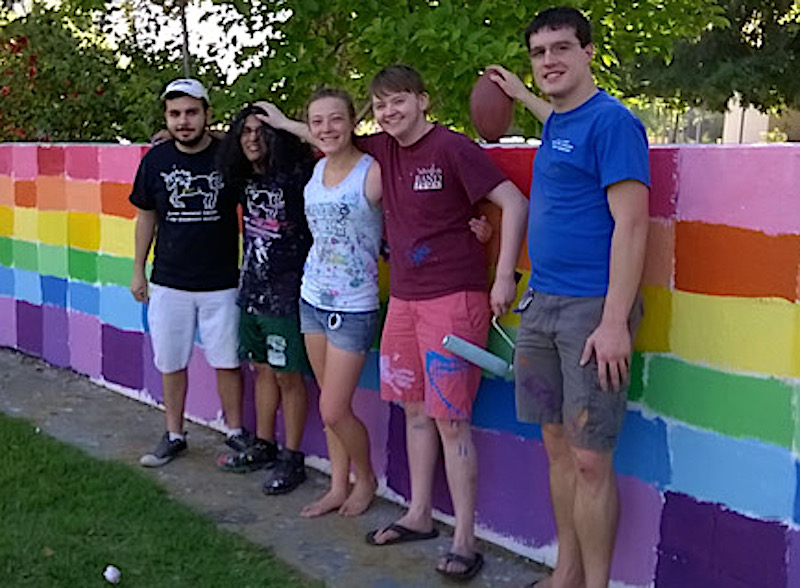
Cal McMillan and friends at Pomona’s annual “Gaypril,” a LGBTQ Pride event.
With his voice and body changing, his parents thought his transition was complete.
But the next year, Cal dropped the final bomb: he wanted “top surgery.”
Stacy was appalled. “You want a double mastectomy? Really?” She told Cal it was “body mutilation” and from what she was reading, lots of transgender men opt to stay natural.
But Cal stood firm and his parents relented.
Ardmore plastic surgeon Kathy Rumer performed Cal’s top surgery in March of 2016, during spring break of his junior year. Highly regarded in the field, Dr. Rumer performs 150 top surgeries each year. The surgery cost $7,000. What wasn’t covered by Pomono’s health insurance, Cal paid for himself. His mother tended to him during his recovery.
Today, Cal looks and sounds every bit the man he has become. In trans parlance, he passes easily.
At his graduation last May, Pomona honored Cal with a prestigious premedical award for best “exemplifying the humanitarian and compassionate qualities of a dedicated physician.” His senior thesis explored transgender health care.
For the last year, he’s been back home in Malvern, getting certified as an EMT, working as an SAT tutor, and saving money for med school. His application essays advocated for better medical training and care for trans people.
And this Sunday, family and friends will gather in western PA to witness his “white coat” induction to the Univ. of Pittsburgh School of Medicine. Mom and Dad couldn’t be prouder.
The Main Line’s trans community has evolved since his Conestoga days, Cal says, with more young people feeling safe to come out.
With the benefit of hindsight, Stacy likens her violent reaction to Cal’s transition to the stages of grief: denial, anger, hurt and finally, acceptance. “Caroline, my little girl, is dead,” she says. “But the person I thought was Caroline is still very much here.”
Fearful for Cal’s safety in an America she considers increasingly emboldened to hate and discriminate, Stacy says she “took no chances.” Soon after the 2016 election, she “scurried around” to have Cal’s name changed on all official documents.
Long at loggerheads, mother and son are sympatico. Each respects the other’s journey. They understand what they didn’t before, that when a child transitions, the whole family transitions.
What people need to know, they say, is that being transgender is not a choice. It’s painful. It’s scary. It’s costly. It inflicts pain on others. Who would choose such a path?
Mother and son agree, too, that seeking out support is key to avoiding the depression and suicide so rampant in trans people.
Cal was luckier than many. His community – his friends, his college, and, eventually, his parents – stood by him.
At the end of our interview, Stacy spoke directly to Cal, her eyes shining, her voice thick with love and hope: “You can be the poster child for this. You’re brilliant. You’re accomplished. You’re a truly good person. You’re everything you want your child to be. You just happen to be trans.”
Cal flashed his mom a smile, a young man at home in his own skin, his own body, at last.
Gottahava Wawa… but maybe not at this busy Wayne corner

Two service stations on Lancaster Ave. – Aberdeen Sunoco and, behind it, BP – may be combined into a (somewhat) Super Wawa with gas pumps.
Wayne is buzzing with word that a semi-Super Wawa has set its sights on Lancaster and Aberdeen Aves.
Aberdeen Sunoco and the BP next door would be bulldozed, replaced by a 24-hour, 5,000 sq. ft. convenience store with 12 gas pumps and 55 parking spaces. For some neighbors, that’s a Big Gulp too hard to swallow.

A preliminary sketch plan for the proposed Wawa. Formal land development plans will likely be submitted to Radnor officials in the fall.
Wawa already has two stores in Wayne. One, just a half mile west on Lancaster, is owned by Gary and Pete Karakelian, the same father/son real estate investors proposing the Wawa complex at Aberdeen.
For more than 30 years, the Karakelians have leased to Aberdeen Sunoco, a full-service car shop, practically a Wayne institution, owned by Howard Reinhart and employing 8. Reinhart, 66, tells SAVVY he’ll retire when his lease ends in a few years.
Less blasé about the Wawa proposal are the pastor and principal of the school and church right across the street, St. Katherine of Siena.
Both Msgr. Hans Brouwers and Principal Bud Tosti tell SAVVY they have deep concerns about student safety at an already congested corner.
About 30 St. Katharine’s kids walk or bike to school, many during rush hour when Wawa is busiest, they say. Mix in walkers from nearby Radnor Middle School and St. Katharine’s long drop-off and dismissal bus and car lines. Combine all that with a bustling Wawa and an already snarled corner becomes a traffic nightmare, they say.
“It’s going to be messy,” says Tosti. He and Browers are also worried about Wawa traffic clogging nearby Midland Ave., causing even more headaches for neighbors.
Their concerns echo those voiced by some neighbors, several of whom spoke at a July 17 meeting hosted by township commissioners.
We’re told another community meeting is coming – likely in September. Meantime, traffic studies are underway and the Karakelians’ attorney, Nick Caniglia, tells SAVVY that preliminary sketch plans are just that – preliminary.
The new Wawa likely wouldn’t open until 2020. Land-development approvals take time – often a year or so.
Btw, this isn’t the first time Wawa has hit rocky Main Line shores. Remember the Super Wawa in Berwyn that would have shared the street with the local fire company? A Goodwill opened instead.
New KOP restaurant J. Alexander’s: All things to all people
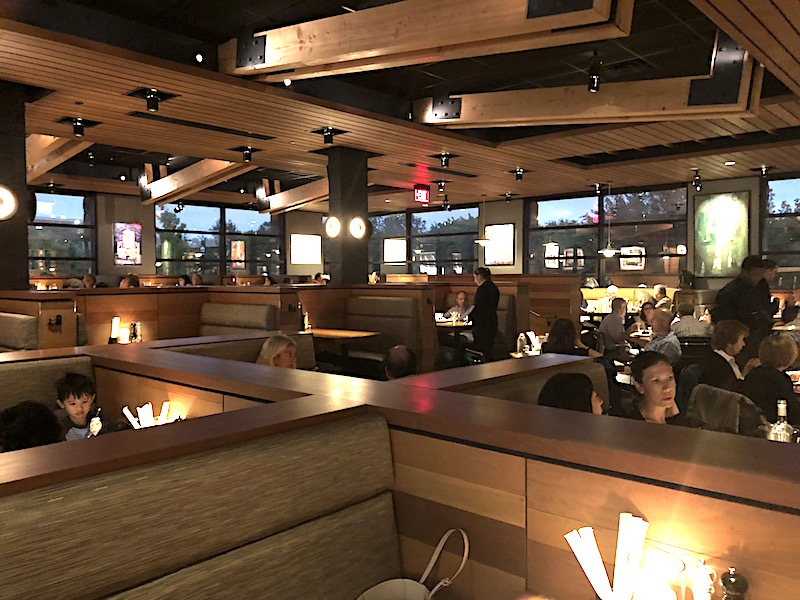
Just when you thought King of Prussia couldn’t possibly support another restaurant comes J. Alexander’s on Mall Blvd. near the Capital Grill. It’s the Nashville-based chain’s first PA outpost.
The look: Pushes all the trendy buttons: open kitchen and bar, sleek wood and earthy fieldstone accents, a maze of booths with seating for 220.
The menu: Plays it safe with throwback faves like Prime Rib, Crabcakes, Fried Shrimp, BBQ Ribs, Filet Mignon with Bearnaise, French Dip, Pork Chop and the inevitable cheeseburger, along with several sushi selections. Food was solid – especially the heirloom cauliflower.
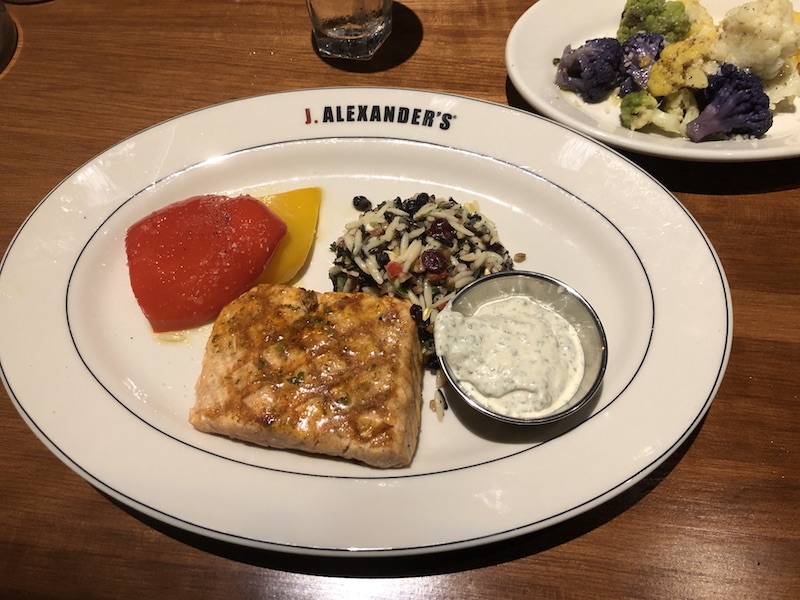
The Norweigian salmon with wild rice, orzo and roasted peppers ($29) with a side of yummy heirloom cauliflower ($7).
The service: Noticeably attentive. Sweats the small stuff – like whether the white napkins would shed on our clothes. We were offered black linen instead.
The prices: You can spend a relative little (cheeseburgers are $14; entrée salads are $16 -$20) or a lot more. Entrées and steaks are in the $20s and $30s.
The crowd: Ultra casual. On a recent Saturday night, the joint was jumpin’ with families, mall shoppers, moviegoers and guests from KOP hotels, most in t-shorts and shorts.
Bottom line: J. Alexander’s aims to please – everyone. It’s a cut above your average chain, but if you’re seeking a place with personality or cutting-edge cuisine, look elsewhere.
J. Alexander’s, 256 Mall Blvd., King of Prussia, opens at 11 a.m. daily.
Sports fields at Stoneleigh? Lower Merion pulls trigger on nearby Clothier mansion

After much public wrangling, Clairemont, the Clothier estate at 1860 Montgomery Ave. in Villanova (above), is looking like the site of the district’s new middle school.
But don’t take down that “Save Stoneleigh” yard sign just yet.
The sloped grounds apparently aren’t suited for playing fields. And that means seizure of part of Stoneleigh, the Main Line’s new public garden, is very much on the table.
The school district has agreed – with some caveats – to pay $12 million for the 22-acre estate, desperate to accommodate exploding enrollment and short on options.
Clairemont has quite the history. It was designed by Horace Trumbauer, the Gilded Age architect behind Ardrossan, the Art Museum and the Free Library, for Morris Clothier, the Strawbrige & Clothier magnate who hosted glittering affairs in its 32 palatial rooms. In the mid- 1950s, it was sold to Churches of Christ, which turned it into a junior college, renaming the mansion “Boone Hall” after singer/supporter Pat Boone.
The estate’s current owner, the Foundation for Islamic Education, runs a Montessori-style school for Muslim kids on the property. The Foundation paid $2.7 million for the estate in 1994, so it would turn a tidy profit on the $12 million sale.
We peeked at the property the other day, and sadly, the once glorious grounds and mansion look shabby and unkempt.
LMSD’s plan to bulldoze Boone Hall and build a new middle school at the site got a big boost when the township killed a move – supported by its own Historical Commission, the Lower Merion Conservancy and other preservationists – to upgrade the estate’s historic resource designation to Class 1, which likely would have saved it from demolition. The bid failed in a 7-7 vote by LM commissioners.
But purchase of the Clothier mansion hinges on the LMSD’s ability to find space for athletic fields. And, yes, district officials say the 6.9 acres at nearby Stoneleigh remain an option. Also worth noting: The school board has retained an attorney expert in eminent domain seizures. You may recall PA just passed a law requiring court approval for such seizures.
So Molly Morrison, president of Natural Lands, the nonprofit that runs Stoneleigh, continues to rally the troops. Among her pleas: sign the petition (more than 36,000 have signed to date), send emails to the LM school board, and keep those lawn signs – now popping up in towns up and down the Main Line – up and visible.
Unusual fashion foray at Wayne’s Gateway Center
Not-your-usual-Main-Line fashion boutique, Alomore, just opened near the Gateway Panera.
The name’s vaguely Italian, but – surprise! – the enterprise is 100-percent Asian.
Alomore is the first U.S. outpost for a Chinese fashion brand designed, manufactured and sold in 93 stores in China, Hong Kong and Thailand – where it goes by the name Hong Yun (“great fortune”).

Tao Zhou, owner of a ubiquitous Asian fashion brand, at the opening of Alomore in Gateway, her first American store. With her are local partner, Wen Luo of Berwyn, and store stylist Kai Yin.
Alomore hopes to appeal to the local Asian community as well as to Main Liners seeking distinctive, modern styles for play, work and black-tie at attractive price points. Preppy it is not.
“Our prices are about half what you would pay for similar styles and quality in department stores,” says Wen Luo, a local partner in the venture. Summer merchandise – about half the store during our visit – was 70 percent off. Price tags show both Chinese and American sizes.
Fun fact: Vanity sizing clearly isn’t a thing in China. A U.S. size 4 is an XL in China. Ouch.
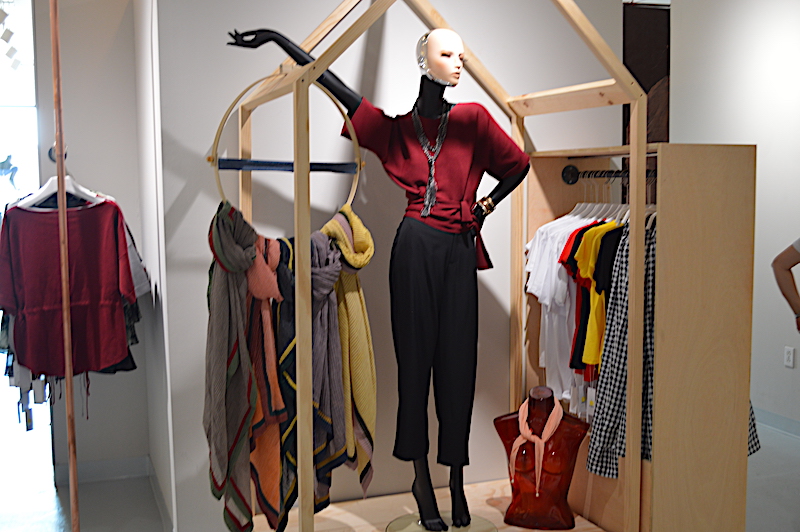
Why bring a Chinese label to Wayne? Company founder Tao Zhou tells us she fell in love with Philly and the Main Line after regular trips to
Berwyn to see her college pal Wen Luo. Plus, research showed a sizable Chinese community in the area.
Alomore, in Tredyffrin’s Gateway Shopping Center, is open 10 a.m. to 9 p.m. weekdays, weekend hours TBA.

Assisted by Wen Luo, Chesterbrook resident Gloria Chen tries on an outfit at Alomore.
New place to apply for a U.S. Passport: Easttown Library
The Berwyn facility just became the first library on the Main Line to offer passport services. It’s a win win, says Easttown Library Director Alan Silverman. The public gets convenient hours at night and on weekends and the library gets extra foot traffic – and pockets a $35 “execution” fee.
In an age when books are downloaded and infinite info is just a click away, “it’s important for libraries to find new ways to stay relevant to the communities they serve,” Silverman tells SAVVY.
for first-time passport applicants only Easttown’s passport services include photos and are by appointment only. Call 610-644-0138.
Songs for Seeds strikes up the band in Ardmore
The coolest of mommy-and-me music classes, Songs for Seeds, is now rockin’ and rollin’ Ardmore. After two years at Club La Maison in Wayne, SFS just moved to bright new space next to Ardmore Library.
Owner/Malvern mom Jill Lottman says she’d been feeling the Ardmore love from guest gigs at Lulu’s Casita, Cricket Crinkle and Cricket Boo. Heading east “seemed like a natural progression,” she says.
Seems Songs hasn’t skipped a beat. Seeds (and their caregivers) are lovin’ the airy new digs at the offices of the nonprofit, Fred’s Footsteps, Lottman says.
An award-winning NYC-based franchise, SFS loosens up old-school mom-and-me music classes. No more squirming on mom’s lap in a circle; tots are up movin’ and groovin’ to a live, three-piece band complete with strobe lights, bubble machines, a stash of play instruments, and fun lessons about colors, shapes, animals, numbers and global culture.
Songs for Seeds, 110 Ardmore Ave., welcomes caregivers and kids, from newborns through age 6 in weekly, 45-minute classes and birthday parties.
Freaked out by stories of people impaled by runaway beach umbrellas?
We’ve got a simple, ingenious solution: Beach Pockets, invented by Team SAVVY’s Barbara Bigford.
On a wind-whipped day in Longport last week, hers was the only umbrella left standing. Take a peek:
Stay safe at the shore. Order your $10 sand anchors here.
A twofer in Lower Merion: Break a Guinness record AND equip city kids for school
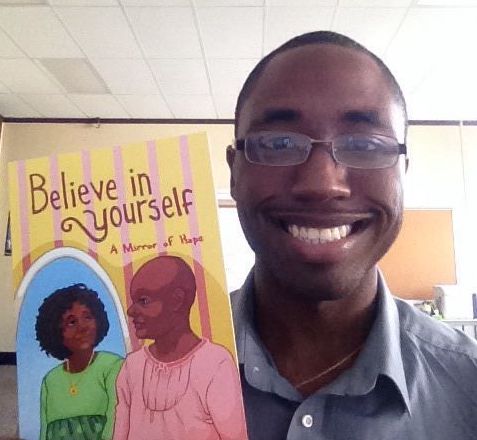
Children’s book author Nahjee Grant has been a regular visitor to his alma mater, Lower Merion High School.
Good-guy alum, author and motivational speaker Nahjee Grant is organizing a backpack-stuffing palooza at Lower Merion HIgh School, where he famously was failing ninth grade before deciding to become a “cool smart kid.”
Grant’s nonprofit (The World Was Made For You) has assembled the judges, timekeepers, school supplies and backpacks. He just needs volunteers to do the stuffing. His goal: 3,000+ backpacks filled in an hour, a new Guinness world record. Once they’re stuffed, the backpacks will be donated to under-served schools in Philly.
Families, youth groups and seniors are invited to come out for the cause. Grant says LM’s school motto – Enter to Learn, Go Forth to Serve – has become his personal credo. “I’m hopeful we can help as many children as we can with this event.”
This and That
~~~~~~
Medical marijuana just got a lot more affordable. Devon’s Keystone Shops begins selling dry leaf medical cannabis this week, just seven days after launching it at its King of Prussia shop amid much hoopla.
“Patient counts have been growing steadily” says Mike Badey (Radnor High ’12), whose partnership group operates Keystone. PA’s greenlight of the cheaper, more popular form of cannabis should take his enterprise to a whole new level, Badey says. “Without a doubt, it’s the lowest cost product line we have,” Badey tells SAVVY.
Indeed, he was so pumped, he threw a party with free food and live music the night dry leaf sales became legal August 1, after which he opened at midnight and served 100 people in two hours.
Patients’ most common ailment? Severe pain. “We see a lot of people who have been on opioids for years who want something you can’t OD on, something more natural that has the same effect,” Badey says.
Sold only in one-gram ($15-$20) and 3.5 gram ($40-$65) packages, Keystone’s offers 11 different kinds of dry leaf, all bearing decidedly non-pharma names like ChemDawg, Green Love Potion and Hash Haze.
~~~~~~
Red meat alert in Bryn Mawr. Restaurant Cerise BYOB will re-open Aug. 24 as Cerise Craft Steakhouse. Chef/owner Ben Thomas tells Philly.com the switch is a response to growing competition, nearby and in KOP. He says he can do the steakhouse concept “better and different” with more interesting side dishes. And it will still be BYOB. Cuts ranging from Bavette Steak au Poivre ($37) to 40-Day Dry Aged Prime New York Strip for $59. Pasta and fish entrées will be in the $30s
~~~~~~
Stop by the KOP Mall next week and you might just brush up against someone with a very famous relative.
Willem Van Gogh, great grandson of Vincent Van Gogh’s brother, will help celebrate the opening of a new Van Gogh Pop-Up exhibit August 16 in the mall just outside Lord & Taylor.

Open through Oct. 15, the pop-up is the first U.S. stop on a yearlong tour staged by the Van Gogh Museum in Amsterdam. Alas, you won’t see Van Gogh originals. But you can touch the brushstrokes on nine “curator-approved replicas” of Van Gogh masterpieces. Admission is $5; free for kids and service personnel.
~~~~~~
Dine out for the Dogs on Aug. 20 at White Dog Cafés in Wayne, Haverford and University City. Chat up WMMR on-air personalities, cuddle with a cutie in the puppy-kissing booth, maybe even win a commissioned pet portrait by Jay McClellan, the artist whose paintings adorn White Dog’s walls. It’s the restaurants’ second annual benefit for Alpha Brava Canine, a nonprofit that trains service dogs for veterans with PTSD and traumatic brain injuries.
~~~~~~
Another reminder to monitor your kids’ social media accounts. Last week Radnor police arrested Nathan Twedt, 22, of Rosemont, for allegedly selling pot to middle schoolers using Snapchat. According to police, Twedt had been dealing to Radnor Middle School students for the last year.
~~~~~~
And finally, a heartfelt salute to two local lions, lost just days apart: Jeremy Nowak, 66, on July 28, two weeks after suffering a massive heart attack, and Gerry Lenfest, 88, on Aug. 8, of complications from chronic illness. Their impacts – Nowak’s on Philly’s struggling neighborhoods via his innovative Reinvestment Fund and Lenfest’s on our city’s civic and cultural life – have been nothing short of colossal. Both won the prestigious Philadelphia Award, Nowak in 1994 and Lenfest, along with his wife, Marguerite, in 2008.
Lenfest had more time here – and loads more money – and consequently leaves the larger legacy. Will our fair city ever spawn another self-made billionaire determined to give away his fortune before he died? Not likely. Lenfest donated an astounding $1.3 billion to education, the arts, media, the environment and the disadvantaged. And he put his mouth where his money was. He was hands-on, directing and re-invigorating stalled projects and inspiring others with means to follow suit.
Here at SAVVY we’re especially grateful to Mr. Lenfest for the cause he championed later in life: local journalism. He believed, as we do, that a free, independent press is vital to our democracy. He swooped in and saved our city’s struggling newspapers, then figured out a way to keep them funded in perpetuity. God bless him for that.
Yes, Philadelphia is an immeasurably better place to live, work and play, because, lucky us, Jeremy Nowak an especially Gerry Lenfest called it home.
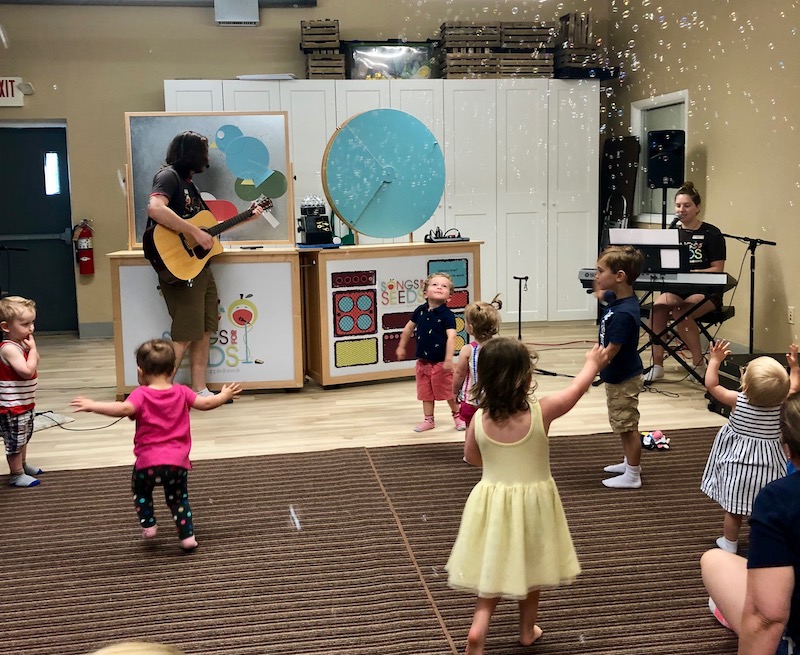

Thank you for highlighting Cal’s story. So many people are frightened of things they don’t know about. Bringing his story to light can help to enlighten our community!
I am grateful to Stacy and Cal for trusting me to tell their raw and poignant story. You’re right – it’s human nature to fear and fight what we don’t understand. Hopefully, this story shines a light.
So glad to hear Cal’s story. I’m sure it was a rough start but I’m so glad to hear that Cal’s family is supportive of him. I’m sure that makes such a huge difference. The best of luck to you and my total admiration for the strength that you’ve shown.
Amazing Brave Honest Article Thank You!
❤️
Thank you Calvin. Spread the word.
As a former TE School Board Director, Chair of Diversity and psychiatric nurse, it is so important to support those that are different. It as you know, is a long process to ask for help, get evaluated and counseled before hormone treatment and surgery. It never is easy.
I have been fortunate to have several friends and family members who have been challenged by their own LGBTQ experiences. I had the great fortune to have a mother who taught me the importance of caring for all those in need.
I also have learned to love and support people where they are as they have similarity loved and supported me for who I am.
As you also know, some transgender persons suffer in silence and sometimes take their own lives. This must stop.
Students/children are quite aware of who they are at an early age.
Likewise, people do not choose to be LGBTQ, as It can be a very difficult road.
Cal, please continue to role model and use your gifts. You a truly a special person headed for greatness in all you do.
Thank you again for sharing your story.
I know it will help one more person on their journey.
Thank you for helping your mom!
I believe every person deserves dignity and respect to openly be whom ever they are.
I love that the parents were so transparent about the raw struggles they went though. It takes a lot of courage to admit your faults – by doing so they have highlighted that the entire family goes through stage of transition. Bravo!
I couldn’t agree more, Jane. This was a very personal and very difficult journey for Stacy and Cal to share with the public. As recently as today, Stacy emailed me to say that she hopes other parents learn from her “mistakes.”
Thanks so much for such a real article about Cal’s journey. I imagine and hope it will help many parents and kids who may have similar struggles.
What a wonderful and honest article! Thanks for sharing this!!!!